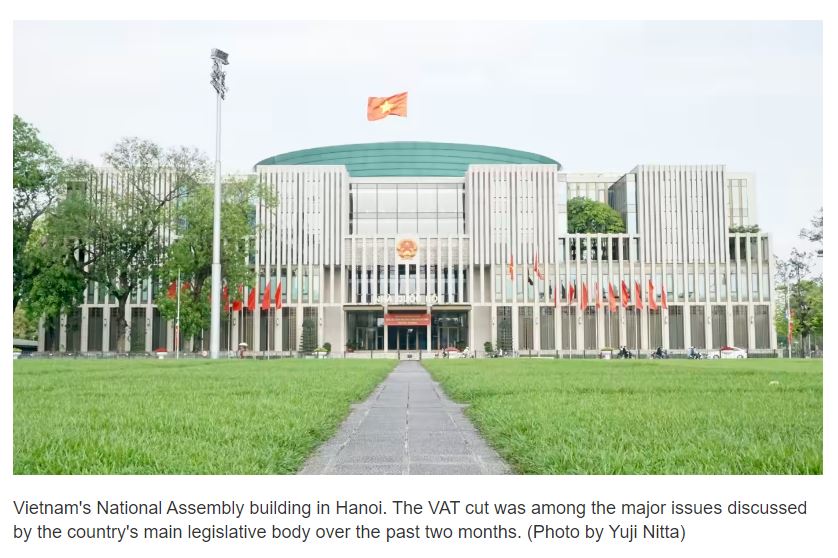Vietnam lowers VAT to 8% again amid economic headwinds
HANOI — Vietnam will lower its value-added tax (VAT) from 10% to 8% from July through December, bolstering stimulus measures to support consumption and business activities as the export-oriented economy grapples with an economic slowdown.
The country’s National Assembly last week passed a bill to lower the VAT from July 1 till the end of December. Some products and services were excluded from the bill, including telecommunications, information technology, insurance, metal products and refined petroleum.
The cut was among the major issues discussed by the legislative body over the past two months.
In April, Le Minh Khai, deputy prime minister in charge of the economy, signed off on a Finance Ministry proposal for a VAT reduction that targeted all products and services.
During discussions, however, some lawmakers proposed that the VAT cut be applied to all items, as many sectors have been struggling after the COVID pandemic. In contrast, others suggested that the reduction should be as much as 5 percentage points and run through 2024.
In the end, they agreed on a cut of 2 percentage points for the second half of 2023. A higher rate reduction — with or without coverage of a wider range of goods and services — would hurt government revenue, according to Secretary General of the National Assembly and Chairman of the National Assembly Office Bui Van Cuong.
According the Finance Ministry, the planned measure will reduce Vietnam’s tax revenue by 24 trillion dong ($1.02 billion) in 2023.
“The government only wants to boost spending power in the short-term to resolve current economic difficulties with the VAT reduction,” explained Minister of Finance Ho Duc Phoc.
Vietnam temporarily lowered VAT from 10% to 8% between February and December last year, which economists say helped the pandemic-hit economy.
The new rate cut comes as Vietnam’s economy has slowed. In 2022, the country’s real gross domestic product grew a brisk 8.02% from a year earlier, one of the fastest in the region. However, growth slowed to 3.32% for the January-March quarter from a year earlier.
Since then, the outlook has weakened, with exports of smartphones and clothing dropping sharply from April, prompting the central bank to cut interest rates to support the economy. Economists will be closely watching the release of second-quarter figures due later this week.
Le Quang Manh, Chairman of the National Assembly’s Finance-Budget Committee, said the VAT cut is expected to support manufacturing and business sectors as well as boost consumption, which has been slowing since the beginning of the year.
Still, he said the effectiveness of the VAT cut could be limited, as it expires in six months.
Vietnamese economist Le Dang Doanh noted that last year’s VAT cut helped the annual retail sales of consumer goods and services climb 19.8%. He also said that government revenue from the VAT actually rose 10% for the year.
This year, Vietnam’s major industries, including textile, garment, footwear and real estate, have faced many difficulties due to plunging exports and slowing domestic consumption. Therefore, the VAT reduction is expected to reduce business costs for these sectors and motivate buyers, Doanh told Nikkei Asia.
Additional reporting by Kim Dung Tong.
Source: https://asia.nikkei.com/Economy/Vietnam-lowers-VAT-to-8-again-amid-economic-headwinds


 English
English




